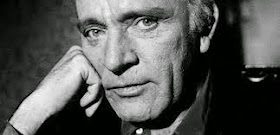He of the mellifluous, baritone voice, the pock-marked face and raging energy wanted desperately to be an actor. More than that, he wanted to be the greatest actor in the world. He wanted to snatch that appellation away from Laurence Olivier. One day, however, Olivier would say to Richard Burton... Make up your mind, Dear Heart. Do you want to be a great actor or a household word?
In my mind, he made only about 10 good films, a rather shocking statement considering his ambition. The films he made before Cleopatra were fine, most of them. One of my favorites is one of the most derided, The Rains of Ranchipur. He played a blond doctor in India who romances a married Lana Turner. There was also The Prince of Players as Edwin Booth, John Wilkes' brother; Ice Palace, battling partner Robert Ryan in an Alaskan fish cannery; the title role in Alexander the Great; an obnoxious bloke in the ultra-depressing Look Back in Anger, and most famously as the man heading the group assigned to crucify Christ in The Robe.
While that great voice boomed, so did his by-now famous libido... he was known to have bedded most of his leading ladies from those films. He would occasionally give breathtakingly celebrated performances on the stage but would have to wait until the next decade to do his best work in films.
After Cleopatra and his marriage to its title star, despite some future occasional good work, he became less known for great acting in important films and more known as a brawling, booze-guzzling, wife-slapping, diamond-buying, jet-setting, party-giving, scandal-ridden, headline-grabbing egomaniac. There was little doubt that this man wouldn't live a long life.
Even when Mrs. Burton wasn't sharing the screen with him, she was often on his set. She felt the urge to advise him, feed him, share cocktails and a little loud lovemaking... anything to keep her rakish husband out of the beds of his comely costars. Through it all, he managed to make some of his better films.
He stayed out of movies with his wife in 1964 and made three of his very best. Becket, with pal Peter O'Toole, was about the rift between King Henry II and his good friend Becket after the latter chooses God over King. It was an absolute masterpiece of acting and writing.
My favorite of all Burton's pictures was John Huston's adaptation of Tennessee Williams' The Night of the Iguana. The Welshman played a defrocked Episcopal priest who has a nervous breakdown. Apparently that doesn't exclude him from driving a bus of Baptist women on a holiday which includes a stop at a small Mexican hotel. With Deborah Kerr and Ava Gardner lending their considerable talents, this was a total romp. Only Sue (Lolita) Lyon was out of her element.
His stage masterpiece, Hamlet, was luckily recorded and put on DVD after his death and for anyone wanting to see brilliant acting and a little Shakespeare to clear out the brain of all those car chases and romantic comedies, this is for you.
I am not particularly fond of films made from John le Carré novels but The Spy Who Came in from the Cold (1965) is considered by others to be among the best. A most unusual spy film (some might say too slow and I would add too much of a downer), it does contain another electric performance by Burton and also costars Claire Bloom and Oskar Werner.
Where Eagles Dare (1968), based on an Alistair MacLean novel, was not only an exciting war story but also a whodunit. Clint Eastwood took second billing to Burton in the fast-paced story of an allied troop that invades a German castle to rescue an American general being held captive. The trouble is they get a great deal more than they bargained for, including how to safely get back out.
In 1969 he provided the best King Henry VIII there ever was in Anne of the Thousand Days... oh, many apologies to Charles Laughton. Blustery, deceitful and licking his chops, Burton brought Henry vividly to life as a man madly in love with and then broken (in his style) by wife #2, Anne Boleyn. A young Geneviève Bujold matched him all the way in the acting department. Both were nominated for Oscars and I think both should have won (over John Wayne and Maggie Smith).
This was his last great film. He made 19 more films, a couple of TV movies and a miniseries. With a possible nod to Equus (1977), the rest ran the gamut from bad to mind-numbingly embarrassing. The less said about them, the better.
I think inside Richard Burton was a great actor. He could indeed have pushed Olivier aside (always over-rated in my opinion) and assumed the mantle. But he lost track of his goal. What he never seemed to lose track of were the perks of acting... and sex and drink did him in. In his peak earning years, he spent so much money buying diamonds that he had to accept crappy scripts with big salaries to pay for them or switch to costume jewelry. He chose the former.
Since his best work was in the sixties, his inclusion here seems appropriate.
NEXT POSTING:
A Notable 60s Film




No comments:
Post a Comment